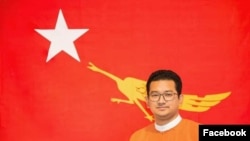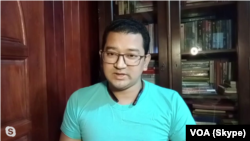Myanmar’s youth have played a leading role in protesting and resisting the military coup of February 2021.
In the Saffron Revolution of 2007, named after the color of the robes of the Buddhist monks who played a large part in the protests, youth participation lasted only for a short time before the movement was brutally quashed. This time, young people have kept involved in the anti-coup movement, continuing the resistance for two years.
VOA’s Ingyin Naing interviewed Sithu Maung, one of Myanmar’s youngest Muslim lawmakers and a member of Aung San Suu Kyi’s National League for Democracy Party, to discuss how the resistance movement is faring two years after the coup.
Sithu Maung, 35 and living in exile, began as a student activist and was imprisoned by the military government between 2007 and 2012 for his involvement in the Saffron Revolution.
In 2020, he was elected to parliament, one of the two Muslim NLD members of parliament, and is the spokesperson for the Committee Representing Pyidaungsu Hluttaw, or CRPH, Myanmar’s parliament group in exile.
This interview has been edited for brevity and clarity.
VOA: During the military coup in February 2021, people from across Myanmar protested. In that movement, young people took the lead. How would you describe the situation two years later?
Sithu Maung, Member of the National League for Democracy Party: At the beginning of the current “Spring Revolution,” young people from all sectors walked the streets and joined protests across the country. The young people in the anti-coup movement have a slogan: “We are young people. We have a future.” Since the military coup, however, young people have felt like they have lost their future. They are worried that the military coup will become the permanent political culture in Myanmar history.
When security forces started to crack down on the protests, the young people defended themselves with sandbags, water tanks, car tires and pipes. Later, during the ongoing demonstrations, they began to realize that they had to do something besides simply protesting in order to see their demands met. They saw that in a democratic system of civilian government, protest is an acceptable way to realize one’s goals. In this situation, in what has become an uncivilized society that relies on weapons and arbitrary acts of violence against peaceful protesters, peaceful protests can no longer be effective.
Because of this, further steps to realize the goals of the Spring Revolution have been taken. Many of the youth came to join Ethnic Armed Organizations in their respective areas near the border. There, in the spirit of waging a war of resistance, they joined the next stage of the revolution.
One can see the negative effects of martial law all around. For example, many young journalists are fleeing to liberated areas [safe areas at the border that the ethnic armed groups control] or to other countries. There are many who continue to report for their respective media organizations even after fleeing to liberated areas in the jungle. I have seen this with my own eyes as I struggle to survive, myself.
VOA: According to the Assistance Association for Political Prisoners, a group that documents human rights violations, more than 900 people between the ages of 16 and 35 have been killed in the military’s crackdown on the pro-democracy movement, and more than 2,800 in that age group have been arrested. As the military attempts to extinguish widespread opposition to its rule, it has targeted the young people who make up the core of the resistance. What effect does that have on the youth movement? Does it discourage them or strengthen their resolve?
Maung: To talk about the effect of oppression in Myanmar, in the past, the sound of a gunshot from the military would go unanswered for decades. Starting in 2007, young people, including myself, were involved in the Saffron Revolution. We protested from September 18 to 26. However, after the crackdown on the 26th, the anti-junta movements calmed down, and the military took back control.
This time, two years after the military coup, despite the brutal repression by the junta, the young people are not quiet and continue to act in every possible way in support of the revolution. The young people are instead resisting the coup d'état. Young people are advancing the cause step by step beyond anything in the past. The key to the success of the revolution is that the youth will not remain silent.
Another thing I see is the fact that young people have more empathy. At one time, many young people who lived in the city didn’t know or understand how the military was operating with impunity in ethnic areas around the country — for example, the atrocities happening in Rakhine state against the Rohingya. When we began to encounter the brutality of the military on the streets, we began to question what we had been told about what was happening in other areas of the country. Once their eyes were opened to the reality of the military’s propaganda, young people began to change. There is now a commonality between the different ethnic groups in the revolution in that we are all being oppressed by the same system. Now that we see this, it has brought more unity to the cause. In that way, the continued oppression has only served to strengthen the protest movement among the youth.
VOA: The junta claims to have outlined a path toward what they say would be democratic elections. The CRPH and the National Unity Government did not accept the junta’s characterization. As a young member of parliament, do you think you will be able to resolve the situation facing the country now?
Maung: What I see as the goal of the Spring Revolution is building a federal democracy in Myanmar. There is a significant difference between the junta’s federalism and our federalism. The different ethnic groups want a federation that brings us together in the spirit of equality while protecting rights for everyone, not under the hand of one party or person. We believe that elections within the existing system are not the way to solve current problems. We want to change the entire system. A real federal system is completely unattainable under the 2008 constitution, so disregarding the 2008 constitution, we are going to go for what we see as a true federal system.
VOA: So, how do you think the military can participate in the path toward democracy going forward?
Maung: In truth, the military has no reason to be involved in politics. Our country will be at peace only if the army is strictly involved in the defense sector. People with military uniforms should not be sitting in a parliament. It is not a battlefield. That's why in the future political vision of my country, the institution of the military does not need to participate in the politics of power. If they participate, it will be only in the defense of the country and defense against foreign countries.





